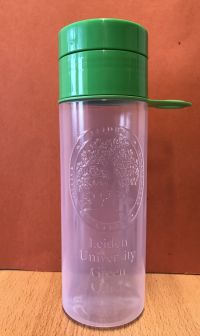
A water pipe from here to Africa
It may not seem necessary to install special tap water stations in University buildings, but it is very useful: every tap here also means a tap in a developing country. With the the 35 tap water stations that Leiden University installs, the slum area of Madoya in Nairobi will soon have clean drinking water. And the amount of plastic waste will reduce in both countries.
The first two water tap stations have already been installed: one in Plexus, and one in the P.J. Veth building. The water tap stations are the initiative of the Leiden University Green Office (LUGO), the student group that champions sustainability at Leiden University. The University ‘buys’ the water tap stations from Join the Pipe. This organisation then invests the money in a project for clean drinking water in the Madoya slum in Nairobi, the capital of Kenya.
Water for just two days
Aleksandra Jovanovic of LUGO is closely involved in the initiative. She knows exactly where the university’s money ends up. ‘The water supply in the Madoya slum is very limited; the water pipes supply water for only two days a week. During the remaining days the 3,000 inhabitants have to make do with one 1,500-litre water storage tank.’ In addition, a lot of waste is dumped in the river adjacent to the neighbourhood and there is only one shower room, and even there you have to use buckets instead of running water.
Bigger water tank
With Leiden University’s donation, concrete improvements will be made in de slum. ‘A much bigger water tank will be installed, holding 10,000 litres,’ Jovanovic explains. The shower room will get electricity, a concrete floor and real showers. There will be special containers for waste – it will still be possible to sell useful waste – and local volunteers will organise a clean-up. Children will also be informed about waste and the plastic soup in the river.
One for one water bottles
This is a double-sided campaign. ‘We are encouraging the use of refillable water bottles both in Leiden and in Kenya as a way of reducing plastic waste.’ LUGO has therefore had its own water bottles specially made, in cooperation with Join the Pipe. ‘We then sell them according to the "one for one" principle: for every water bottle purchased by a student or employee of the University, one water bottle will be handed out in Madoya.’
Longest water pipe
The goal of Join the Pipe is to provide everyone with clean drinking water and to curb the use of (disposable) bottles. By installing their Join the Pipe water tap stations both in the Netherlands and in developing countries, they create – virtually – the longest water pipe in the world. ‘What that means is that the same water taps will be installed in Madoya as in Leiden and the Hague,’ Jovanovic explains. ‘You could say we are making a water pipe from here to Kenya.’

Buy your own LUGO water bottle!
The Leiden University Green Office has had its own, unique refillable water bottles made. The bottles cost 2.50 euros each, and will soon be available in all university cafés and restaurants. By buying a bottle, you are supporting the Join the Pipe project in Madoya: for every bottle bought here, a bottle will also be handed out in Madoya.
The first two water tap stations have now been installed. The installation of more water tap stations will start in mid-March, at more than thirty locations in Leiden and the Hague. An information board will be placed by every tap point, explaining the project in Madoya.
